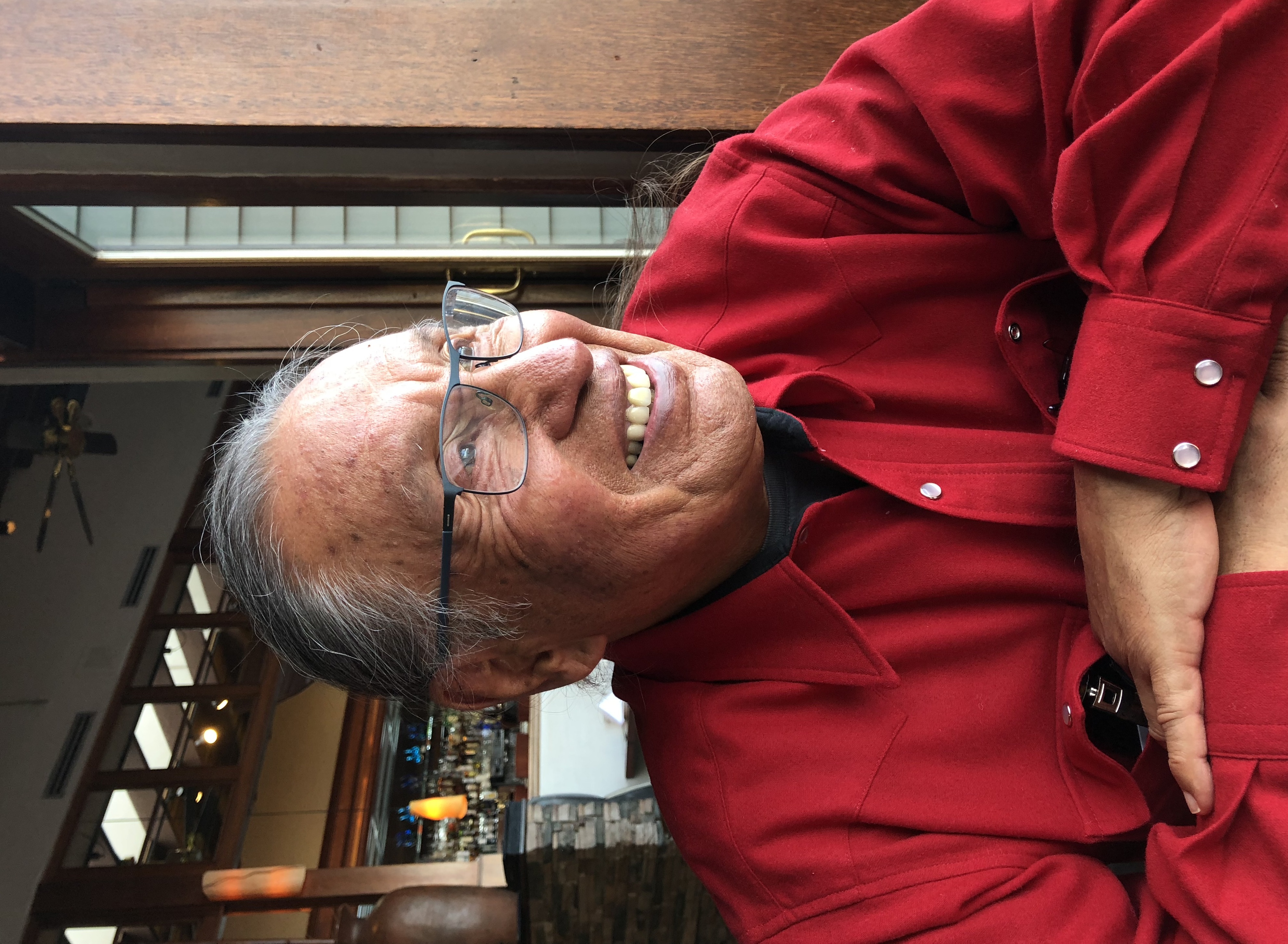HAS A DEATH OCCURRED? WE ARE AVAILABLE 24/7 (253) 200-1515
(253) 200-1515  LIVE CHAT
LIVE CHAT
HAS A DEATH OCCURRED? WE ARE AVAILABLE 24/7 (253) 200-1515
(253) 200-1515  LIVE CHAT
LIVE CHAT


Obituary of Gilbert King George
Gilbert “Hoagie” King George
sqialupcub
March 26, 1938 – April 11, 2023
I was born on March 26, 1938 where my mom’s two-room cabin stood, on her father Henry King George’s allotment, near Henry’s father’s longhouse on Soos Creek. My grandfather’s father loaded weapons for his relative Chief Leschi during the First Treaty War. This sacred land that was returned to Our People through the efforts of our extended family of warriors, whose descendants are so precious to me.
I never knew my father, Chester Courville, who was a paratrooper, killed in action liberating France during the Normandy invasion. He was one of three valiant Muckleshoots who sacrificed their lives to free Europe from the Nazis.
My Mom, Eva Mae King George Jerry was well known for keeping and teaching our sacred language, despite the Catholics’ best effort to rob her of our language during her time at St. George’s “boarding school.”
I lived to see my 85th birthday because of sqəlalitut, because of my Grandma Mary Cheholtz King George McCarty Charles saving me during childhood and instilling in me the teachings of Our People, and because of my wife Tallis. When news of death came to my Grandma, she would look up from her knitting and say, “No more sick. No more pain.” It was a powerful lesson.
Our ancient teachings have helped Our People survive for millennia. Be a good Indian person. Work hard. Always do your best. Tell the truth. Think of others before yourself. Take care of nature and nature will take care of you. Share what you have. Take no shortcuts in your work or spiritual life. Remember who you are, who you come from. Take care of the graves. Our history is our future.
There were many special Japanese Americans I was fortunate to know including John Hamakami, Katsuma Murakami, Tom Maikawa, and George Kawasaki who all treated me as a son. I thank them and my Mom, for my strong work ethic. We as Muckleshoots share a dark history with our Japanese American friends in the Green River Valley. We both had our land taken illegally, and some of our people never recovered.
As a young man, I contracted tuberculosis and was incarcerated in the Cushman Indian Hospital on the Puyallup reservation for over a year. I witnessed firsthand how an epidemic ravaged Our People. A young friend Dale Nagashowa, from Chief Pocatello, kept my spirit up and helped me survive that ordeal.
I followed Fred Lane into the Indian Relocation Program, receiving pre-vocational training at South Seattle Community College. They placed me in a master barber program in San Jose, California where I lived for about a year. The Beatles put an end to the barber business, so I went to work in the woods, logging, like so many other Muckleshoot men - mostly for gyppo outfits but later for Weyerhaeuser.
My people recruited me to run for Tribal Council and I won a seat in 1970. The community celebrated the newly elected council members with a gathering at the community hall. The hall burned to the ground later that night.
I traveled across the country to secure funding for a proposed Bingo enterprise, an idea put forward by my cousin, Shirley Sneatlum. After witnessing the mob connections in Atlantic City at that time, I was convinced that the financing should come from Indian Country. The Seminole Tribe was the premier high-stakes bingo operation. They agreed to finance Muckleshoot. I sacrificed my political career for the fateful decision to sign the financing documents, but I knew it was our only chance to secure the economic future of Our People.
Fishing was a way of life since childhood as was smoking salmon. My nephews Tyson Simmons and Wy am wak shet know how it's done. No shortcuts. I made a video for you, My People, so you would always know.
Led by fish chiefs Herman “Acey” Moses and his brother Cecil, I joined in Muckleshoot’s Second Treaty War, securing our treaty right to fish. I am proud to say I was one of Muckleshoot’s last spear pole men.
We won the First Treaty War because our culture was still strong, we still had our power, and we were willing to die for each other and for this land. We stood up for our relatives and they came to fight alongside us.
We won our Second War because we still understood our treaty, because we still lived off the gifts from our rivers, we still lived by the hunt. We smoked fish and put away for the winter. We knew our usual and accustomed grounds and stations. We knew who we came from. We again stood up for each other, the same allied tribes that won our First Treaty War.
Years later, I championed the purchase of shellfish lands on Vashon Island and established the Community Garden to help feed the people. I never forgot the gnaw of only having raw rhubarb for lunch or the feeling of buying shoes for school when I didn’t already own a pair.
I learned to hunt from my older brother Henry King George. My cousin George “Crow” Cross and I provided meat for many funerals through the years. When a death occurred, Crow would say to me, “You know what we need to do.”
I have always loved My People, serving them as Executive Director, Housing Director, and Vice Chair of the Fish Committee. Later, I volunteered as a shellfish tech, to enhance clams and oysters with my great friend Andy Dalton, and planting cedar trees that will stand along the path for years to come.
When I was at what you might call the height of my career - short hair, dress shirt and tie - I stopped eating. Over forty days without food. I went to Lummi where the great healer Petius understood what was needed and I became a singer. My power chose me. Petius told me to bring this back to Muckleshoot. When I built the first Smokehouse, a place to practice Our First Religion, we reclaimed our cultural sovereignty. It’s as though we have to earn the right to live our lives in peace. We, as a people are still trying to heal. They say time will heal. I say, the clock is ticking, folks.
My time has come to take my rightful place among my Old People. We have felt their presence in support of the work Tallis and I have done to honor them, over the last 24 years. I have directed Tallis and our team of young scholars together to carry on the work of reclaiming and telling the truth about Muckleshoot history.
We prayed for two decades for the return of the Arthur C. Ballard papers to all Our People, and for the publication of Ballard’s manuscript, Listen My Nephew. They contain testimony and oral history from our ancestors, describing who we are, how we are related to each other, and what villages we come from. They document our medicines, our language, spiritual knowledge, and our stories going back to the time of the Changer.
This treasure box of our own history belongs to us, the descendants; a warrior people who can regain our strength and power. Our history tells of our ancestor’s valor, strength, and victory. It comes down in the blood we all carry. It is a medicine for Our People whom we are losing at a catastrophic rate. How many of you will hear the words, how many of you will listen?
I have lived my life a proud Muckleshoot man, a warrior descendant, and a veteran of the Second Treaty War. Life has been so good; following our Indian Walk of Life.
Gilbert is survived by his wife, Tallis King George; by his beloved children by the late Tina Williams: Warren King George (Elizabeth), Leanne Denunzio (Nick), and Laverne Mathias (Lionell); precious grandchildren Lavina King George (Avery), Hailey Joe (Jacob), Alice Ollie Purcell (Anthony), Nathaniel Williams, Shayla Mathias (Talon) Nicholas Denunzio (Zanetta), Katelyn Mathias (Gabby), Lashelle Denunzio; granddaughter/niece Kirah Marquard; and great-grandchildren Kayla Kiely, Ashton, Aadyen, and Adrian Mather-Purcell, and Ariyah Tohtsoni his brother Pete Jerry; sisters Donna Starr and Theresa Jerry; and special son in law David Purcell.
He joins his parents; his late daughter, Kristine Alice Osoteo; brothers Henry King George, Donald, Ronnie, and Frank “Hoppy” Jerry; and sisters Judy, Gertrude, and Mary Jerry.

Copyright © 2024 | Terms of use & privacy Policy


